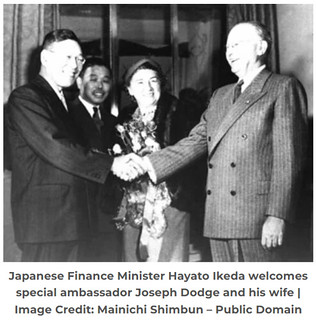
PREV ARTICLE
NEXT ARTICLE
FULL ISSUE
PREV FULL ISSUE
EISENHOWER'S ECONOMY FIXER: JOE DODGENo one can know results in advance (and the comparisons may be meaningless), but this article draws parallels between today's Department of Government Efficiency (DOGE) and the 19th century era of rampant inflation and worthless paper money. Here's an excerpt - see the complete article online. -Editor
Born in Detroit in 1890, Joe Dodge was a successful Michigan banker nearing retirement when he was tapped to chair the War Contracts Board during World War II. His scrutiny of the deals between the government and armaments firms paid off. He saved taxpayers the equivalent of 200 billion in today's dollars. With the war's end in 1945, the devastated German economy required his attention. General of the Army Dwight D. Eisenhower wired Washington: "Get Dodge to Germany fast." ... Ravaged by hyperinflation, Germans often preferred cigarettes to near-worthless German marks. To begin correcting a desperate situation, Dodge advised spending cuts and a balanced budget. Following the work of the young economist Edward Tenenbaum, who also advised the post-war administration in West Germany and would later be known as the "Father of the Deutschemark," Dodge also proposed a 90 percent reduction in paper currency. Germans would receive one new mark for ten old ones. Dodge's reforms were just taking root in West Germany when, in early 1949, President Truman dispatched him to Japan to work with the Supreme Commander of the Allied Powers, the legendary General Douglas MacArthur. What became known as "The Dodge Line" did the trick. By implementing a balanced national budget and shutting down the printing presses, it ended hyperinflation. It drastically reduced government economic intervention across the board. It rationalized an incomprehensible tax code. Dodge's intention was not to "plan" the Japanese economy, but rather to finally leave it alone. He killed every subsidy and price control he could get his hands on, and MacArthur cheered him as he did it. Once inflation was killed, Dodge established a yen-to-dollar exchange rate of 360-to-1, where it remained unchanged for almost a quarter-century. Stable money became a key pillar of the Japanese economic miracle. Gone in Dodge's first budget for Japan were the Liquor Rationing Public Corporation and the Petroleum Rationing Public Corporation, along with dozens of other departments and bureaucracies. Another notable and deserving casualty was the Reconstruction Finance Bank, which made so many bad loans and fostered so much money printing that its effect was nicknamed "Reconstruction Finance Bank Inflation" by many Japanese. Dodge closed it down—lock, stock, and barrel.
To read the complete article, see:
Wayne Homren, Editor The Numismatic Bibliomania Society is a non-profit organization promoting numismatic literature. See our web site at coinbooks.org. To submit items for publication in The E-Sylum, write to the Editor at this address: whomren@gmail.com To subscribe go to: Subscribe All Rights Reserved. NBS Home Page Contact the NBS webmaster 
|
